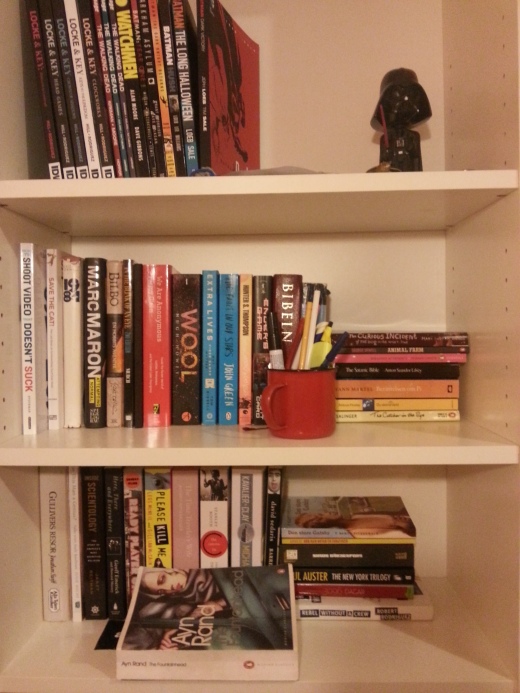This year is about to end so here is one of my year- end post trying to summarize the year of 2013. I will be posting one each Monday throughout December, each taking a look into a certain area of entertainment. It shall be as an autopsy, digging through my guts to find what kind of popular culture I'd put into my digestive system during the year 2013. Or maybe it's more a list for myself to remember what I did spend my time on during the year.
Hardly education
All them books I didn’t read
They just sat there on my shelf
Looking much smarter than me
Text from: Modest Mouse’s Education
This year I’ve probably read more books than any other. It’s just recently that I’ve begun to read a lot of books. In my youth I managed to get in some Harry Potter and Lord of the Rings, though not much else. In high school I for the first time read a book that really altered the world around me. George Orwell’s 1984, is an amazing book that I urge everyone to read. It might still be my go to book for answering the question of my favorite book.
Thirteen books in total, everything from last years big young adult hit The Fault in Our Stars, to neurotic comedian Marc Maron’s book Attempting Normal. It’s a fine mix between drama, science fiction, non-fiction and some educational books about the art of film making.
I started the year of reading both John Green’s The Fault in Our Stars and Mark Haddon’s The Curious Incident of the Dog in the Night-Time. I’m pairing these books together not because I read them one after the other, but because they are both books about two people suffering from illnesses that they will probably carry with them throughout their lives, and they are both at once entertaining and also offers a view, be it fictional, into the lives of people with these specific illnesses.
The first, by John Green, is a romance book about a teenage girl, Hazel, who suffers from lung cancer. She’s forced by her parents to participate in a support group for cancer patients and it’s here that she meets a boy in which she falls in love. I bought the book 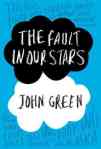 because it topped some “greatest books of 2012”-list and so I bought it without knowing what I was going to get. As I started reading the book I hated it, I hated it in the same way I don’t like certain “smart”-labelled romance movies targeted to a teenage audience. Movies with well read teenagers talking with a rapid pace spitting out clever remarks. But after a while I got really into the book, and about halfway through I couldn’t put the book down and read it in one swoop. This is also one of the few books I’ve cried while reading, maybe not few, maybe only. It’s truly great and for what I know it is getting turned into a movie so look forward to some sick teenagers making out in a cinema near you soon.
because it topped some “greatest books of 2012”-list and so I bought it without knowing what I was going to get. As I started reading the book I hated it, I hated it in the same way I don’t like certain “smart”-labelled romance movies targeted to a teenage audience. Movies with well read teenagers talking with a rapid pace spitting out clever remarks. But after a while I got really into the book, and about halfway through I couldn’t put the book down and read it in one swoop. This is also one of the few books I’ve cried while reading, maybe not few, maybe only. It’s truly great and for what I know it is getting turned into a movie so look forward to some sick teenagers making out in a cinema near you soon.
The second, by Mark Haddon, is a detective book, kind of. It’s a diary written by a child with Asperger Syndrome. He goes to a special class and is encouraged by his teacher to write a book, so he starts to write about a case involving the murder of his  neighbors puddle, Wellington. It follows him partly being a detective and questioning people in his neighborhood, but also just some notes about his day-to-day life and his relationship to his recently separated parents. It is a bit as if a child had written it, a child with a huge interest in mathematics. The chapters are divided into pi-numbers and some of the pages have drawings on them. It might seem a bit silly, but I thought this was a great book as well. A light read about a boy with a somewhat a topical diagnosis in the autistic tree of psychological illnesses.
neighbors puddle, Wellington. It follows him partly being a detective and questioning people in his neighborhood, but also just some notes about his day-to-day life and his relationship to his recently separated parents. It is a bit as if a child had written it, a child with a huge interest in mathematics. The chapters are divided into pi-numbers and some of the pages have drawings on them. It might seem a bit silly, but I thought this was a great book as well. A light read about a boy with a somewhat a topical diagnosis in the autistic tree of psychological illnesses.
I’ve also read some science fiction books with the popular post-apocalypse book series Wool, the recently screen adopted Ender’s Game and a classic in the genre, Brave New World. Mr. Aldrous Huxley’s book I got recommend to  be by a friend who knew how much I like 1984, but I didn’t think it was all that great. It seemed to drag on for the most parts and I didn’t find it to be all too interesting a read. If you don’t know it already Brave New World paints a picture of a future where the human race is grown and we are breathed into a structured class system. Our genes are altered and with some Freudian childcare tools are made to become a certain kind of person. We are also given an unlimited supply of drugs which let us pleasure ourselves out of reality. I never got a clear view of the world I was reading about apart of these clear divergences from the real world. And when it got clear where the story was going I lost interest and just read through it not because I wanted to know what came next, but because I wanted it to end and be able to put it back in my bookshelf.
be by a friend who knew how much I like 1984, but I didn’t think it was all that great. It seemed to drag on for the most parts and I didn’t find it to be all too interesting a read. If you don’t know it already Brave New World paints a picture of a future where the human race is grown and we are breathed into a structured class system. Our genes are altered and with some Freudian childcare tools are made to become a certain kind of person. We are also given an unlimited supply of drugs which let us pleasure ourselves out of reality. I never got a clear view of the world I was reading about apart of these clear divergences from the real world. And when it got clear where the story was going I lost interest and just read through it not because I wanted to know what came next, but because I wanted it to end and be able to put it back in my bookshelf.
Wool, by Hugh Howley, is set in an post-apocalyptic world. A society of people live in a silo beneath the earth and stay there to survive out of reach of the poison which lives in the air outside. The only view of the desert landscape outside are through cameras mounted on the outside, and these are in need of cleaning once in a while. There are certain rules which you have to follow and if  some citizen in the silo does not they are sent out to clean these cameras, then they collapse and join the rest of the corpses outside the gates. Wool omnibus is a collection of five books which were at first released separately as eBooks online. The book started out great, the setting was interesting and there’s a mystery to the books which you want to figure out as you’re reading. At times it felt as Lost did at its very best, and it handles it’s mysteries a lot better than Lost did. Yet I lost interest in the book towards the end. I stopped reading it as frequently as I had done and for a while I just let it lay untouched for a long while. I don’t know why really, it just carries on a bit to long I think. I also found that we got introduced to people late in the book, but at that point I didn’t want to read about them. I wanted to read about the adventure of the people I already knew and cared about. The book has an end, but I know that there are two other series of books in the series as a whole. A part from Wool, which is the first part in the Silo series, there is also Shift, which is set before Wool, and also Dust which is set after Wool. I’m probably not going to read these, I thought Wool’s ending was satisfying enough and I’m not all to eager to read more from the world Wool created.
some citizen in the silo does not they are sent out to clean these cameras, then they collapse and join the rest of the corpses outside the gates. Wool omnibus is a collection of five books which were at first released separately as eBooks online. The book started out great, the setting was interesting and there’s a mystery to the books which you want to figure out as you’re reading. At times it felt as Lost did at its very best, and it handles it’s mysteries a lot better than Lost did. Yet I lost interest in the book towards the end. I stopped reading it as frequently as I had done and for a while I just let it lay untouched for a long while. I don’t know why really, it just carries on a bit to long I think. I also found that we got introduced to people late in the book, but at that point I didn’t want to read about them. I wanted to read about the adventure of the people I already knew and cared about. The book has an end, but I know that there are two other series of books in the series as a whole. A part from Wool, which is the first part in the Silo series, there is also Shift, which is set before Wool, and also Dust which is set after Wool. I’m probably not going to read these, I thought Wool’s ending was satisfying enough and I’m not all to eager to read more from the world Wool created.
The 80’s science-fiction classic Ender’s Game by Orson Scott Card is the best book I’ve read this year. It’s about a super-intelligent 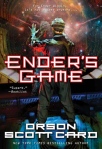 boy, Ender, who’s the third child in his family. He’s an experiment altered to lead and be a great warrior in a war against an alien species. Both his older siblings are also super-intelligent, though its him, the third attempt, which gets drafted to an outer space military school. Here he’s pushed to and sometimes beyond his limit and are asked to the unthinkable. At this school there is a great emphasis put into games, simulations and sports and Ender quickly rises in ranks and gets put in charge of a platoon of children. I thought this book was wonderful, especially after I’d read it and could see how the whole story was put together. I highly recommend this book to everyone reading this. I haven’t seen the movie, and I don’t know if I ever will, but I’ve heard that it cuts out a lot of things from the book. So even if you have seen the film, read the book also.
boy, Ender, who’s the third child in his family. He’s an experiment altered to lead and be a great warrior in a war against an alien species. Both his older siblings are also super-intelligent, though its him, the third attempt, which gets drafted to an outer space military school. Here he’s pushed to and sometimes beyond his limit and are asked to the unthinkable. At this school there is a great emphasis put into games, simulations and sports and Ender quickly rises in ranks and gets put in charge of a platoon of children. I thought this book was wonderful, especially after I’d read it and could see how the whole story was put together. I highly recommend this book to everyone reading this. I haven’t seen the movie, and I don’t know if I ever will, but I’ve heard that it cuts out a lot of things from the book. So even if you have seen the film, read the book also.
With all that fiction out-of-the-way I’ve read and purchased a lot of nonfiction books this year. During the summer I read a thick red book about the hacktivist group Anonymous called ‘We Are Anonymous, Inside the Hacker World of LulzSec, Anonymous and the Global Cyber Insurgency’ by Parmy Olson. It was a great read about a group of outcasts using their computers and social media to try to demonstrate and make their voices heard. Or you know, just for the lulz.
Global Cyber Insurgency’ by Parmy Olson. It was a great read about a group of outcasts using their computers and social media to try to demonstrate and make their voices heard. Or you know, just for the lulz.
I got strangely nostalgic for a time and place which I never really saw or got to know about some time afterwards. The book talks a lot, of course, about 4chan, and even though I never was a very frequent visitor of the site I had some friends who were and they would share some of its crazy antics with me. Such as the huge protests outside of Scientology buildings, trolling on the Tom Green Show and random ramblings of a collective of bored and/or mad geniuses.
As I finished the book I also watched two documentaries, one called We are Legion about Anonymous which touches on some of the same subjects as Olson’s book does, and the recent documentary We Steal Secrets about WikiLeaks which is also somewhat related.
I also, half jokingly, read LaVey’s book The Satanic Bible. In my teenage year I was interested in both LaVey and Crowley and the occult and satanic, as many teenagers probably are. I read a lot about it on the internet but never read the book itself, so I ordered it online and read it. It felt as though I’d read most of the book already online when I was younger. I didn’t really like the book, it doesn’t seem to be all to controversial, but I can see how it was back when it was released, and probably especially in the country of LaVey’s origin, USA. But reading it now it just seemed silly, of course there are a lot of fairly uncontroversial views on how you should live your life, but it’s hard to see through the chose of font and the cheap snake figures that begins each chapter.
online and read it. It felt as though I’d read most of the book already online when I was younger. I didn’t really like the book, it doesn’t seem to be all to controversial, but I can see how it was back when it was released, and probably especially in the country of LaVey’s origin, USA. But reading it now it just seemed silly, of course there are a lot of fairly uncontroversial views on how you should live your life, but it’s hard to see through the chose of font and the cheap snake figures that begins each chapter.
A book about video games during the recent era of the now previous console generation called Extra Lives, why video games matter by Tom Bissell. It’s a collection of essays his written about his time spent playing video games and thought on the media. There are some interviews with game designers such as Cliff Bleszinski and Peter Molyneux. I don’t really know all that much about the video game industry and its history. This book might cover mostly recent releases and gaming trends which are still somewhat current but it’s at-least something. Compared to other entertainment-medias such as music, film and literature I have a lot more insight into those older forms of entertainment than I do of video games. But also video games has the dilemma of age and growing obsolete a lot quicker, which this Conan video is an example of. A part from Indie Game: The Movie, another book by Jim Rossignol, This Gaming Life: Travels in Three Cities, and perhaps the A Life Well Wasted podcast, I can’t name any other.
know all that much about the video game industry and its history. This book might cover mostly recent releases and gaming trends which are still somewhat current but it’s at-least something. Compared to other entertainment-medias such as music, film and literature I have a lot more insight into those older forms of entertainment than I do of video games. But also video games has the dilemma of age and growing obsolete a lot quicker, which this Conan video is an example of. A part from Indie Game: The Movie, another book by Jim Rossignol, This Gaming Life: Travels in Three Cities, and perhaps the A Life Well Wasted podcast, I can’t name any other.
There were a lot of reading spent on books about film making as well. Three in total ranging from topics of screenwriting, editing and directing. ‘Save The Cat! The Last Book On Screenwriting That You’ll Ever Need’ by Blake Snyder I heard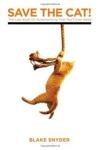 about from the screenwriters behind the 2012 animated Disney film Wreck-It Ralph. It’s was during an interview with Jeff Goldsmith on his podcast The Q&A with Jeff Goldsmith. I think I grasped quite early on where it was that author Blake Snyder where coming from as he shared his advice for achieving success in the Hollywood system as a screenwriter and could contextualize the text and it’s lessons. I’ve shared my views on this book before. That comic was based on a Twitter conversation where I asked for recommendations for books on the subject on film making, and he told me to forget everything I’ve read in Snyder’s book and get Walter Murch’s book In the Blink of an Eye instead.
about from the screenwriters behind the 2012 animated Disney film Wreck-It Ralph. It’s was during an interview with Jeff Goldsmith on his podcast The Q&A with Jeff Goldsmith. I think I grasped quite early on where it was that author Blake Snyder where coming from as he shared his advice for achieving success in the Hollywood system as a screenwriter and could contextualize the text and it’s lessons. I’ve shared my views on this book before. That comic was based on a Twitter conversation where I asked for recommendations for books on the subject on film making, and he told me to forget everything I’ve read in Snyder’s book and get Walter Murch’s book In the Blink of an Eye instead.
 Walter Murch’s book mostly talks about film making from the perspective of a film editor. On his WikiPedia page there’s a paragraph stating that he’s the only editor to get Academy Awards nominations for films edited on four different systems. In his book he talks a lot about the history of editing, how it went from analog to digital. He talks about the process of editing and certain methods different directors use. Also shares his philosophy about film editing and it being close to a dream in it rapid cuts and blurring of time and space. I though this was a great read, but the greatest is still to come.
Walter Murch’s book mostly talks about film making from the perspective of a film editor. On his WikiPedia page there’s a paragraph stating that he’s the only editor to get Academy Awards nominations for films edited on four different systems. In his book he talks a lot about the history of editing, how it went from analog to digital. He talks about the process of editing and certain methods different directors use. Also shares his philosophy about film editing and it being close to a dream in it rapid cuts and blurring of time and space. I though this was a great read, but the greatest is still to come.
 For I also read a small book by David Mamet on Directing. It’s mostly transcripts from talks he has held on schools. He talks a lot about how he thinks about acting and of what to show with the camera. There is a section of the book where he and the audience collectively creates a scene together, and it’s great. He turns down the students suggestions and tells them why and really goes to the core of cinematic story telling. I haven’t read a lot of books on the subject, but I thought that apart of the actual work this book has thought me the most on how to make film.
For I also read a small book by David Mamet on Directing. It’s mostly transcripts from talks he has held on schools. He talks a lot about how he thinks about acting and of what to show with the camera. There is a section of the book where he and the audience collectively creates a scene together, and it’s great. He turns down the students suggestions and tells them why and really goes to the core of cinematic story telling. I haven’t read a lot of books on the subject, but I thought that apart of the actual work this book has thought me the most on how to make film.
I also read two book by two different comedians that happens to be two of the biggest podcast-hosts today, Adam Carolla’s ‘In Fifty Years We’ll All Be Chicks… And Other Complaints from an Angry Middle-Aged White Guy’ and Marc Maron’s ‘Attempting Normal’. Adam Carolla’s book is mostly a lot of thoughts and complaints about today’s society and Marc Maron’s book are a collection of stories from his life as a comedian and a nervous person who’s lived through many failed relationships and who found his peak late in life through his podcast.
Years We’ll All Be Chicks… And Other Complaints from an Angry Middle-Aged White Guy’ and Marc Maron’s ‘Attempting Normal’. Adam Carolla’s book is mostly a lot of thoughts and complaints about today’s society and Marc Maron’s book are a collection of stories from his life as a comedian and a nervous person who’s lived through many failed relationships and who found his peak late in life through his podcast.
There’s been years since I listened to Adam Carolla’s podcast and I got the book lent to me by my brother who really liked it. I didn’t, there were some parts of it that I liked and thought was funny but in broad strokes I thought I’d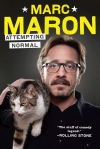 heard a lot of his material used in his podcast already. I guess if you’re a big fan of the guy you’ll like it a bit more.
heard a lot of his material used in his podcast already. I guess if you’re a big fan of the guy you’ll like it a bit more.
Marc Maron’s book I liked a lot more. I’m a fan, let’s be upright about is, I listen to his podcast and liked his show well enough, I think it had potential and could get better with another season. There were some parts of the book which I recognized from his stand-up cd’s and others which I’d heard through his podcast or on different talk-shows. But I liked the book I thought it was really funny at parts and I read through it quickly in a few well planed sittings.
Attempting Normal probably won’t be the last book I will read this year. I got Ayn Rand’s book The Fountainhead lent to me by Z4’s Ken. It’s a thick book so I wanted to have read Attempting Normal before I started in on it, and then it took a little while for me to actually start reading Attempting Normal.
I’m almost a hundred pages into the book, it really grabbed my attention from the first scene. I really like the usage of language somehow, and even though one of the two main characters is a little less interesting than the other I like it so far.
That’s the first and probably longest (we’ll see) end of the year post. The next chapter focusing in on some of the music I’ve been enjoying this soon to be past year.
See ya
-B

